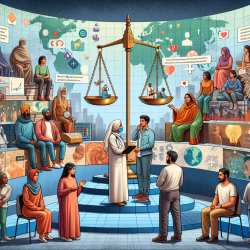Introduction
In the ever-evolving field of global health, understanding the nuances of its definitions and applications is crucial for practitioners aiming to improve their skills and outcomes. The research article "Defining global health: findings from a systematic review and thematic analysis of the literature" offers a comprehensive examination of global health definitions, providing valuable insights for practitioners in speech language pathology and other health-related fields.
Key Insights from the Research
The systematic review conducted in the study analyzed 78 publications, revealing four major theoretical categories that define global health:
- Multiplex Approach: Global health is seen as a multifaceted approach to improving worldwide health, emphasizing interdisciplinary collaboration and research.
- Ethical Orientation: It is guided by principles of justice and equity, ensuring health improvement for all people.
- Mode of Governance: Global health involves governance that influences problem identification, decision-making, and resource allocation across borders.
- Versatile Concept: Despite its vagueness, global health is a versatile concept with historical antecedents and an emergent future.
Implications for Practitioners
For practitioners in speech language pathology, these insights can be transformative:
- Interdisciplinary Collaboration: Embrace the multiplex nature of global health by collaborating with professionals from various disciplines to enhance therapeutic outcomes for children.
- Ethical Practice: Incorporate justice principles into practice by advocating for equitable access to speech therapy services for all children, regardless of their background.
- Global Perspective: Understand the influence of global governance on local practices and leverage international resources and knowledge to improve service delivery.
- Adaptability: Stay informed about the evolving definitions and applications of global health to remain adaptable and responsive to new challenges and opportunities.
Encouraging Further Research
Practitioners are encouraged to delve deeper into the thematic categories identified in the study. By exploring the intersections of global health with their specific field, they can contribute to a more comprehensive understanding and application of these concepts in practice. Engaging in further research and discussions will not only enhance individual skills but also advance the field as a whole.
Conclusion
The insights from the systematic review of global health definitions offer a valuable framework for practitioners seeking to improve their skills and outcomes. By embracing interdisciplinary collaboration, ethical practice, a global perspective, and adaptability, practitioners can make informed, data-driven decisions that lead to better outcomes for children.
To read the original research paper, please follow this link: Defining global health: findings from a systematic review and thematic analysis of the literature.










